- Home
- Allison Brennan
Killing Justice Page 7
Killing Justice Read online
Page 7
He tried to sound tough, but his voice cracked at the end. He was scared. He feared for his life when the lives of the innocent meant nothing to him.
“That group home, the same one that Rickie Coleman slipped out of to kill my son, is still in operation. And because of you, it will not be shut down.”
“That's not the role of state government—”
“Bullshit!” Swearing surprised her as much as her volume. “You stacked the committee! You killed my bill!”
“Mrs. Stewart, it's only legislation—it can't bring your son back.”
“Timmy! His name is Timmy! Do you know how many juvenile sex offenders escaped and hurt children? Do you?”
“Mrs. Stewart—”
“We don't know because they're minors and their records are confidential! And because the people who run those homes make millions of dollars off the system, they'll never be shut down. The group home in my own neighborhood? The owner makes three times the market value every month on an inflated lease. Is that the price of a child? Seven thousand dollars a month?”
Beck took a step toward her and Hannah pulled the trigger.
VI.
“Senator, they're evacuating the building,” Greg exclaimed as he ran into Matt's office, his lips in a tight, white line.
“What's going on? Bomb threat?”
“There's a gunman in the building.”
“They'd lockdown if there was a gunman loose, not evacuate,” Matt said. His instincts hummed.
“I'm just relaying what the Sergeants told me. He’s in the historic building; the annex has been locked down and is being evacuated. It's mandatory.”
Matt waved his hand dismissively at Greg and turned on the television by remote.
“...Capitol building is being evacuated. Nothing more is known at this time.”
The picture switched from a reporter outside the east entrance of the capitol to the bureau chief. “Sources in the building tell NBC news that every office has been ordered to evacuate immediately. A gunman is in the building. Wait—”
The reporter listened to his earpiece. “A shot has been confirmed fired. Three separate sources report that a shot has been fired on the second floor of the historic building. Sources indicate the shot may have come from Senate Pro Tem Beck's office, a Democrat from Los Angeles.”
“Simon,” Matt whispered.
He pictured the look on Hannah's face when he told her about the committee.
Suddenly, the last five years became clear. For the first time Matt realized what he’d done. The last major case he tried before filing for office was the Timothy Stewart murder. It was the judge’s idiocy that had propelled him to seek the senate seat. He’d wanted to fix the system in a way that a prosecutor couldn’t—by changing the laws.
And then he brought Hannah Stewart in to help his cause. She'd seemed the perfect spokeswoman for reform: an eloquent, attractive mother, a person the press and the people could relate to. She joined his bandwagon to change the laws, to ensure that children were protected and violent predators—whatever their age—were locked up where they couldn’t hurt anyone.
It had been his cause because he’d lost in court when he hated to lose—and rarely did. Rickie Coleman had been convicted, but the judge threw out the first-degree murder charge—believing Coleman when he said he didn’t intend to kill the boy—and Coleman ended up with manslaughter and a nine-year sentence.
Matt had wanted to change the system, fix what was broken, and he used every means possible.
Including a woman so devastated by grief that she hadn’t truly lived in five years.
He suddenly knew who the “gunman” was.
He had unwittingly created her.
VII.
The Sergeant-At-Arms, Bob Bush, ran a hand over his mustache, a nervous habit he'd thought he'd broken. In charge of Capitol security for the past twenty years, he'd had his share of situations. But never had a shot been fired in the Capitol under his watch.
“CHP is on alert,” Jefferson said.
They stood outside Beck's office, which had been immediately evacuated after the gunshot. He'd just debriefed the secretary, who didn’t know anything.
“Where's the damn security tape?”
The security camera outside the senator's office would have recorded who'd passed through the door.
“They're viewing it downstairs right now,” Jefferson said, listening to his earpiece. “They have an I.D. Hannah Stewart, Caucasian female, forty-two.”
“Who the hell is she?”
A commotion outside the door had Bob turning. He saw Senator Elliott trying to bypass the shield they'd set up around the office.
“Senator, you need to evacuate,” Bob said, turning around to talk to Jefferson before he'd finished his sentence.
“I know Hannah.”
Bob stopped, turned to him. “She won't pick up the phone. We've been trying to call into the office for the last five minutes.”
“She'll talk to me. Please, let me go in.”
“I can’t do that, we don't even know if Senator Beck is alive. SWAT is getting into position.”
“Don't shoot her.”
“He’s been ordered to assess the situation and report.”
“Please, Bob. I can defuse this.”
“What's her story?”
“She testified on one of my bills in Public Safety. It was defeated today.”
“She's holding Beck hostage because a bill got killed?”
“No. She's holding Beck hostage because her son got killed and she doesn't think anyone cares.”
VIII.
The Sergeants would not let him go in, but that didn't faze Matt. He had an idea.
He ran upstairs to the third floor to the Republican leader's office. The floor was oddly deserted. The windows in the gallery were sealed shut, but those in the Member’s offices could be opened. Matt walked in through the leader's “escape” door—an unmarked entrance directly into his office from the side hallway. Few legislators kept their private door locked.
Matt crossed to the window behind the desk, directly above Beck's office. He opened the window. A portico traversed the west steps of the Capitol building, but stopped before reaching the office windows.
Matt looked down, swallowed heavily. A three-foot ledge ran under the windows, but if he slipped . . . the drop was already precarious because of the seventeen-foot ceilings. But broken ankles were the least of his concern now. To his left was a spindly palm tree, to his right the top of a tree with long, narrow leaves. It didn’t look sturdy enough to climb down, but if he fell from the ledge, the tree would prevent him from hitting ground.
He knew Beck's little secret—after hours, he often opened that window and leaned out to smoke cigars. Not once had Matt seen him lock it.
Without hesitating, Matt flung open the far window and climbed out, holding onto the ledge, his legs dangling over, and assessing the drop. He hung there only a moment before falling . . .
Slam. Right on the ledge. His knees protested, but nothing broke. He teetered a moment, grabbed a thin branch to steady himself. He shook off the pain, shimmied along the ledge to Beck’s unlocked window and pushed it open.
Hannah stood over Beck's desk, a gun aimed at his chest. Beck's face was ashen and he lay awkwardly across his chair.
He was too late.
XI.
“What the hell was that?” Bob Bush exclaimed at the faint thump coming from outside the building.
Jefferson listened, then said, “SWAT reports that a man jumped from the third floor onto the balcony and has entered Beck's office.”
Bob bit back expletives. “Who?”
“No confirmation yet. He was wearing gray slacks and white button-down, rolled up at the sleeves. Dark hair, approximately six foot one inch—”
“Matt Elliott. Ring the office.” Dammit, did the Senator want to get both him and Beck killed?
Bob held the phone to his ear as it rang and rang.
/>
XII.
“Let me answer the phone,” Matt told Hannah.
“Why are you here?”
“Hannah, please.”
She didn't respond, and Matt slowly reached over to Beck's desk, watching Hannah’s eyes the entire time. He pressed line one, picked up the phone. “It's Matt Elliott.”
“Senator, what are you doing?” Bob Bush exclaimed.
“Beck is alive. Give me five minutes.”
He hung up over Bob’s protests. “Hannah,” he said, “you don't want to do this.”
He glanced at the Senate leader. There was no blood; she hadn't shot him. Something was still wrong. Beck's mouth moved rapidly, but no words came out. He was pale and his left eye seemed to look in a different direction than his right. Heart attack? Didn't matter, Beck needed medical attention immediately.
“You don't want to kill him.”
Hannah looked at him with blue eyes filled with anguish so tangible Matt's own heart broke.
“No one cares about Timmy,” she whispered.
“You care, Hannah. You've done everything you can. I'm not going to let anyone forget about your son.”
Tears welled in her eyes. “Today—today he would have been fifteen.”
Matt had forgotten. He'd breathed nothing but the Timothy Stewart homicide for five and a half years, but he hadn't remembered the child's birthday.
His mother would never forget.
“I'm so sorry, Hannah. I've done everything I could to make sure no other mother suffers like you have.”
She shook her head. “He—” She waved the gun at Beck and swallowed. “People like him don't care. All they see are numbers and statistics. And money. Always the money. Like the life of a child has a price on it! All they had to do was give parents information. Give us a chance to protect our children. I’d have walked Timmy home myself every day if I’d known those sex offenders lived in that house. But no one can protect the children if we don't even know what we're up against!”
Matt was concerned about Beck. His breathing was shallow, his face clammy, and an odd sound emanated from his throat. Maybe it was a stroke, not a heart attack. Hannah seemed oblivious.
If Beck died, she'd be charged with second-degree murder. Matt didn't know if he could live with that on his conscious.
“What about Rachel?”
Hannah blinked, really looked at him for the first time. “Rachel?”
“How can you protect your niece if you go to prison? What is Meg going to tell Timmy's cousin? Rachel needs you. Meg needs you. She's stood by you from the very beginning. She sat next to you during Coleman's trial every single day. Think of how she will feel if you go to prison. Or if SWAT shoots you.”
Matt had spied the SWAT team member in the tree across the path, and blocked his direct line of fire. He couldn't let Hannah die, especially not as a criminal.
He couldn't let Beck die.
“I'm nothing,” she whispered.
“Hannah, you're living in hell. Let me help bring you back. Please.”
She stared at him. “Promise me one thing.”
“What?”
“You won't stop until Timothy's Law passes.”
“That I can promise you.” Arms outstretched, he took a step toward her. “Hand me the gun.”
She nodded.
His momentary relief that she was giving up the fight dissipated as Hannah brought the gun to her head.
“No!”
He leaped toward her.
The gun went off.
IX.
Three Months Later
“Matt, Sandra Cullen is here to see you.”
“Thanks, Bonnie.”
Bonnie was the last of his staff. When he announced last month that he wasn’t seeking reelection, his entire staff found other jobs. He didn’t blame them, though there were still six months left in his term. He didn’t care that he was staffless. He had nothing he wanted to accomplish—at least in this building.
He’d already done all the damage he could.
Sandy closed the door behind her. She was a petite woman, skinny through excess energy. She’d been the District Attorney of Sacramento County for coming on twelve years, as well as his former boss. He had complete respect for her. It was Sandy who had tried to stop him from running for state senate. He’d accused her of playing politics—he was taking out a member of her party. But in hindsight, she’d wanted to spare him the pain of failure.
An idealist in government simply tilted at windmills, she’d said.
“I'm not going to try to change your mind,” she said, “because you're going to make a damn fine D.A.”
When Sandy had announced her retirement, Matt had tossed his hat into the ring. She’d endorsed him immediately.
Already, he felt like the world that had crashed down three months ago was rising just enough to allow him to breathe.
“Thought you might like to know that my office just accepted a plea on Hannah Stewart’s case. She’ll remain at Napa State Hospital for twelve months.”
“No jail time?”
Sandy frowned. “I know you think I’m callous, but I couldn’t fight for jail time on this one. I would have got it. But in a trial, I think I would have ended with a hung jury. She wanted—and needed—to go to the mental hospital.”
“Thank you.”
“I read in the paper that Beck was released from the hospital yesterday. Is he coming back? It was unclear.”
“He’s still incapacitated from the stroke. He doesn’t have mobility on his left side at all, though he’s regaining his speech.”
“Have you seen him?”
“No.”
“And Hannah?”
He paused. “Once.” It had been awkward for both of them. He thought originally she’d been too embarrassed and grateful that he’d knocked her hand away before she killed herself. Instead, she’d blamed him for her failed suicide attempt.
“I just don’t want to live anymore.”
“Matt, I always said you were too good for this building.”
He shook his head. “Wouldn’t it be better if there were more people here like us? Then maybe we could make a difference.”
She smiled sadly. “When Hell freezes over.”
###
Dear Reader:
Whenever I write a short story or novella, I consider setting. I want a place I know well, which is why almost all my short stories are set in the Sacramento area. I’ve lived here most of my adult life and don’t need to spend as much time on research.
Research is still very important to me, and I have a lot of fun participating in research “field trips”—I’ve toured the morgue, observed an autopsy, visited the FBI Academy at Quantico, and am a role player in FBI SWAT training exercises. But most of my research is done the old-fashioned way—reading, personal interviews, and on-line. For example, when I learned through a newspaper article that the Sacramento Police Department only had six detectives in their sex crimes squad, I knew I wanted to write a story about it. I called the Public Information Officer with SPD and asked him many questions about their caseload, the types of cases they investigate, and how they’re assigned.
Detective Selena Black popped into my head fully-formed and ready to star in a book. I felt that I knew her so well, that when I started writing “Above Reproach” it came out in first person. This scared me because I’d only written one very short story in first person and didn’t know if I could sustain it for a novella.
But as a writer, I always want to try new things, new styles, and new ideas. I wanted to challenge myself and Selena Black seemed the best way to do that.
“Above Reproach” was originally published in early 2012 by Murder She Writes, a blog I co-founded in 2005. It’s the longest story in this anthology, and my personal favorite. I hope you like it.
Happy Reading!
Allison Brennan
2012
Above Reproach
I.
“The victi
m is Ashley Young,” the responding officer, Sampson, told me as I approached. It was officially Tuesday morning: 12:02 a.m.
I recognized Sampson from the station, but hadn’t worked a case with him. “We found her purse over there.” He gestured toward the Dumpster near where the alley and walkway intersected. He handed me her California driver’s license. Ashley was twenty-four, five feet five inches tall, one hundred ten pounds, blond hair and blue eyes.
Pretty and blond, just the way Greg Keller—aka “the River City Rapist”—liked his prey.
I stuffed my hands back into the pockets of my wool coat. The fog had thickened after the sunset, penetrating my bones. The fog layer was supposed to keep the rain away, but the ground had been wet after a week of this unending dreariness. Usually I liked the gray; tonight it was simply depressing.
“Why are we still in the alley?”
“Ms. Young started to panic when I suggested we go to the car. My partner fetched the blanket for her.” His tone was a bit defensive. My reputation preceded me once again.
“Good,” I said, hoping to smooth the relationship. I was known as the stereotypical bitch cop. The reputation wasn’t wholly warranted; it stemmed from a couple cases early in my career. But like the game of telephone, truth became distorted in the repeated telling.
I said, “Check on the ambulance, would you please? The paramedics should be here by now.”
Sampson stepped aside and got on his radio.
Ashley watched me as I approached. I showed her my badge. “I’m Detective Selena Black with Sac P.D. It’s my job to find the guy who did this.”
She just stared, and I feared she was going into shock. Her arms were wrapped around her stomach, the blanket tucked firmly under her chin, and when I stepped closer, she pulled away, rubbing against the filthy brick wall that reeked of urine and garbage, pulling herself into a tighter ball.
I needed to give her a moment to feel comfortable with my presence, and then I’d start asking questions.

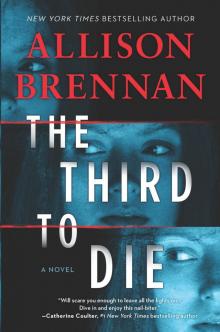 The Third to Die
The Third to Die Nothing to Hide
Nothing to Hide No Way Out
No Way Out Cold as Ice
Cold as Ice Cut and Run
Cut and Run No Way Out (Lucy Kincaid Novels)
No Way Out (Lucy Kincaid Novels) Storm Warning
Storm Warning Betrayed: Powerful Stories of Kick-Ass Crime Survivors
Betrayed: Powerful Stories of Kick-Ass Crime Survivors Killing Fear pb-1
Killing Fear pb-1 Make Them Pay
Make Them Pay The Lost Girls
The Lost Girls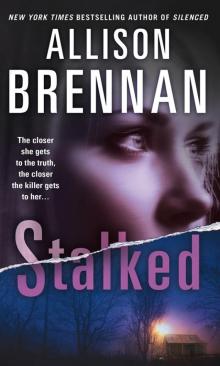 Stalked
Stalked Killing Justice
Killing Justice A Deeper Fear
A Deeper Fear Poisonous
Poisonous Fear No Evil
Fear No Evil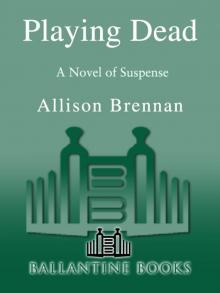 Playing Dead
Playing Dead Cold Snap
Cold Snap Vacation Interrupted
Vacation Interrupted Frosted (Moreno & Hart Mysteries)
Frosted (Moreno & Hart Mysteries) 2 - The Hunt
2 - The Hunt Stolen
Stolen No Good Deed
No Good Deed Cutting Edge
Cutting Edge Deliver Us from Evil
Deliver Us from Evil If I Should Die
If I Should Die Speak No Evil
Speak No Evil Silenced lk-4
Silenced lk-4 Original Sin sds-1
Original Sin sds-1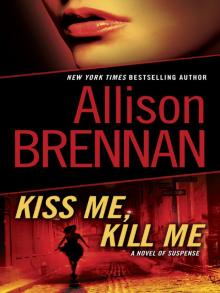 Kiss Me, Kill Me lk-2
Kiss Me, Kill Me lk-2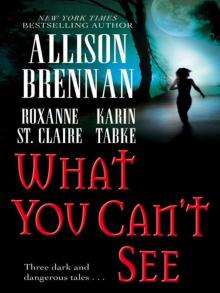 What You Can’t See
What You Can’t See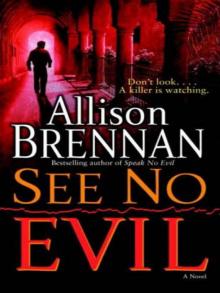 See No Evil
See No Evil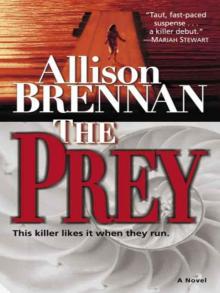 The Prey
The Prey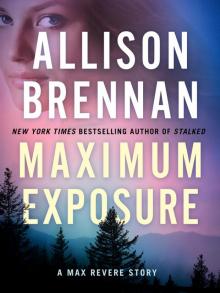 Maximum Exposure
Maximum Exposure Fatal Secrets f-2
Fatal Secrets f-2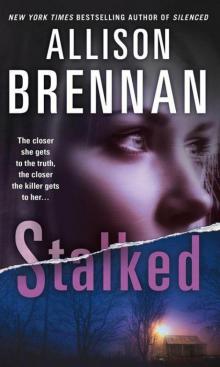 Stalked lk-5
Stalked lk-5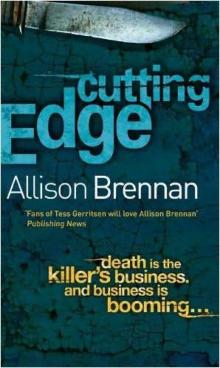 Cutting Edge f-3
Cutting Edge f-3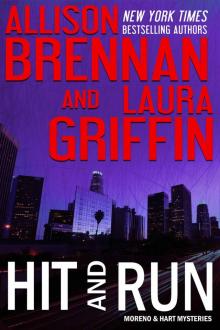 Hit and Run (Moreno & Hart Mysteries)
Hit and Run (Moreno & Hart Mysteries)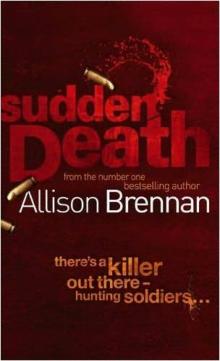 Sudden Death f-1
Sudden Death f-1 If I Should Die lk-3
If I Should Die lk-3 Notorious
Notorious Abandoned
Abandoned Fatal Secrets
Fatal Secrets The Hunt
The Hunt Carnal Sin sds-2
Carnal Sin sds-2 Love Is Murder
Love Is Murder Lost and Found
Lost and Found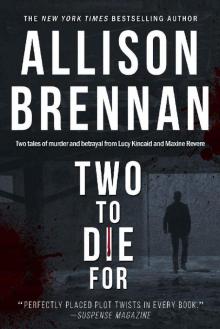 TWO TO DIE FOR
TWO TO DIE FOR Breaking Point
Breaking Point Best Laid Plans
Best Laid Plans Carnal Sin
Carnal Sin Silenced
Silenced Dead Heat
Dead Heat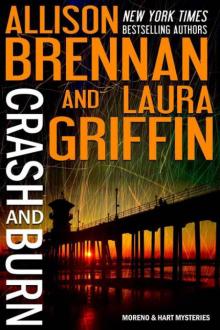 Crash and Burn
Crash and Burn Sudden Death
Sudden Death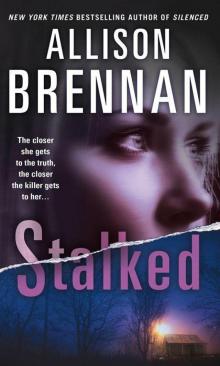 Lucy - 05 - Stalked
Lucy - 05 - Stalked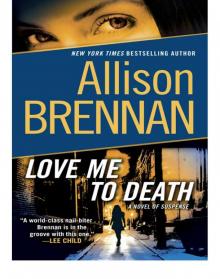 Mortal Sin
Mortal Sin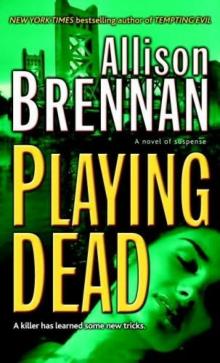 Playing Dead pb-3
Playing Dead pb-3 Kiss Me, Kill Me
Kiss Me, Kill Me Original Sin: The Seven Deadly Sins
Original Sin: The Seven Deadly Sins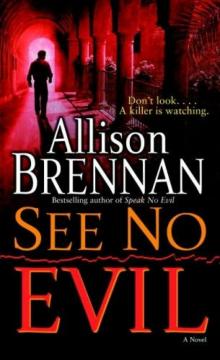 See No Evil e-2
See No Evil e-2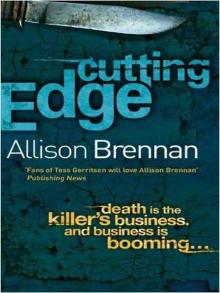 Cutting Edge: A Novel of Suspense
Cutting Edge: A Novel of Suspense Original Sin
Original Sin Too Far Gone
Too Far Gone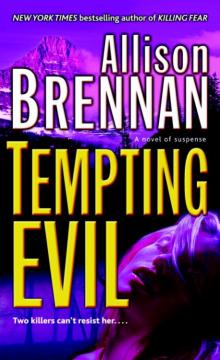 Tempting Evil
Tempting Evil Shattered
Shattered Killing Fear
Killing Fear Murder in the River City
Murder in the River City Love Is Murder (lucy kincaid)
Love Is Murder (lucy kincaid) Stolen (Lucy Kincaid Novels)
Stolen (Lucy Kincaid Novels)